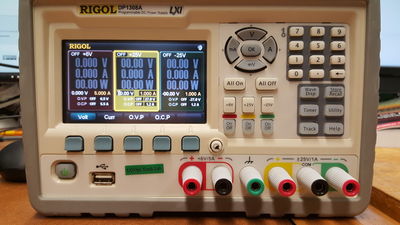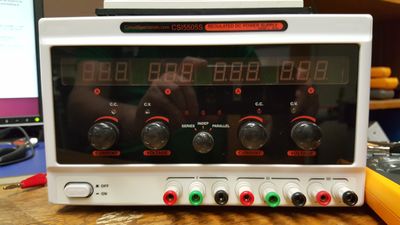Difference between revisions of "Power Supplies"
Aplstudent (talk | contribs) (Created page with "This module will teach you how to use both analog and digital power supplies. While there will be different power supplies in the world in which you will interact, this will ...") |
Aplstudent (talk | contribs) |
||
| Line 1: | Line 1: | ||
This module will teach you how to use both analog and digital power supplies. While there will be different power supplies in the world in which you will interact, this will gain you the basic knowledge of power supplies to be able to handle any power supply you come across. | This module will teach you how to use both analog and digital power supplies. While there will be different power supplies in the world in which you will interact, this will gain you the basic knowledge of power supplies to be able to handle any power supply you come across. | ||
| − | The analog power supply we will work with is the model HY3003D-3 and information can be found in this [http://www.jameco.com/Jameco/Products/ProdDS/211684.pdf data sheet] or [http://www.rapidonline.com/pdf/554308_v1.pdf user manual]. It is important to note that many different manufacturers will make the HY3003D-3 model of regulated analog power supply. While the interface might be different, the | + | The analog power supply we will work with is the model HY3003D-3 and information can be found in this [http://www.jameco.com/Jameco/Products/ProdDS/211684.pdf data sheet] or [http://www.rapidonline.com/pdf/554308_v1.pdf user manual]. It is important to note that many different manufacturers will make the HY3003D-3 model of regulated analog power supply. While the interface might be different, the circuit diagram is the same. |
| − | |||
| − | |||
The digital power supply used is the Rigol DP1308A and information can be found [http://www.rigolna.com/products/dc-power-supplies/dp1000a/dp1308a/ here], specifically under the documents tab and looking at either the [http://beyondmeasure.rigoltech.com/acton/attachment/1579/f-0021/0/-/-/-/-/file.pdf data sheet] or [http://beyondmeasure.rigoltech.com/acton/attachment/1579/f-002c/1/-/-/-/-/DP1308A%20User's%20Guide.pdf user manual]. | The digital power supply used is the Rigol DP1308A and information can be found [http://www.rigolna.com/products/dc-power-supplies/dp1000a/dp1308a/ here], specifically under the documents tab and looking at either the [http://beyondmeasure.rigoltech.com/acton/attachment/1579/f-0021/0/-/-/-/-/file.pdf data sheet] or [http://beyondmeasure.rigoltech.com/acton/attachment/1579/f-002c/1/-/-/-/-/DP1308A%20User's%20Guide.pdf user manual]. | ||
| Line 13: | Line 11: | ||
<li> Rigola DP1308A digital DC Power Supply</li> | <li> Rigola DP1308A digital DC Power Supply</li> | ||
<li> HY3003D-3 analog DC Power Supply</li> | <li> HY3003D-3 analog DC Power Supply</li> | ||
| − | <li>Fluke 179 True RMS | + | <li> 2 Fluke 179 True RMS multimeters</li> |
<li> An assortment of short wires</li> | <li> An assortment of short wires</li> | ||
<li> Resistors: 10ohm and 10kohm</li> | <li> Resistors: 10ohm and 10kohm</li> | ||
| Line 20: | Line 18: | ||
<li> BNC Cables</li> | <li> BNC Cables</li> | ||
</ul> | </ul> | ||
| + | |||
| + | This module assumes some familiarity with the [[Multimeters]] and detail will not always be explained when using these devices. | ||
| + | |||
| + | This module is part of the [[General Lab Equipment Obstacle Course]]. | ||
| + | |||
| + | == Floating and Grounding == | ||
| + | |||
| + | It is important to first discuss the difference between a floating power supply and a grounded power supply. | ||
| + | |||
| + | [https://en.wikipedia.org/wiki/Ground_%28electricity%29 Ground] is a physical connection to the earth (ground). For American three pronged outlets, the extra little third prong will attach to ground. | ||
| + | |||
| + | [https://en.wikipedia.org/wiki/Floating_ground Floating] circuits will have a point of lowest potential, but this value could be anything relative to ground. This is what occurs for American two pronged outlets and batteries. | ||
| + | |||
| + | == Analog Power Supply == | ||
| + | This section will cover use of the HY3003D-3 analog DC Power Supply. First discuss the basic nature of the power supply and then discuss the three operating modes. | ||
| + | |||
| + | === General Analog Power Supply Information === | ||
| + | |||
| + | [[File:Analog power supply front.jpg|400px|thumb|right|Front of a HY3003D-3 analog power supply, noting that this particular model does not state it on the front]] | ||
| + | |||
| + | The HY3003D-3 analog power supply has meaning to its name, breaking into parts HY-30-03-D-3 | ||
| + | <ol> | ||
| + | <li> HY- Brand/manufacturer</li> | ||
| + | <li> 30- Maximum output voltage (30 volts)</li> | ||
| + | <li> 03- Maximum output current (3 Amps)</li> | ||
| + | <li> D- Display type (LCD)</li> | ||
| + | <li> 3- Number of outputs (3)</li> | ||
| + | </ol> | ||
| + | There are three outputs on the analog power supply- | ||
| + | <ol> | ||
| + | <li> Floating Constant 5V</li> | ||
| + | tacos | ||
| + | <li> Master Output</li> | ||
| + | <li> Slave Output</li> | ||
| + | </ol> | ||
| + | |||
| + | We will first discuss the constant 5 volt output. First to explore, we use the multimeter in | ||
| + | |||
| + | === Operating in Independent Mode === | ||
| + | |||
| + | |||
| + | === Operating in Series Mode === | ||
| + | |||
| + | |||
| + | === Operating in Parallel Mode === | ||
Revision as of 13:31, 29 January 2016
This module will teach you how to use both analog and digital power supplies. While there will be different power supplies in the world in which you will interact, this will gain you the basic knowledge of power supplies to be able to handle any power supply you come across.
The analog power supply we will work with is the model HY3003D-3 and information can be found in this data sheet or user manual. It is important to note that many different manufacturers will make the HY3003D-3 model of regulated analog power supply. While the interface might be different, the circuit diagram is the same.
The digital power supply used is the Rigol DP1308A and information can be found here, specifically under the documents tab and looking at either the data sheet or user manual.
For this module, you will need:
- Rigola DP1308A digital DC Power Supply
- HY3003D-3 analog DC Power Supply
- 2 Fluke 179 True RMS multimeters
- An assortment of short wires
- Resistors: 10ohm and 10kohm
- A breadboard (or protoboard)
- BNC-Banana Plug Adaptor (with male BNC plug)
- BNC Cables
This module assumes some familiarity with the Multimeters and detail will not always be explained when using these devices.
This module is part of the General Lab Equipment Obstacle Course.
Contents
Floating and Grounding
It is important to first discuss the difference between a floating power supply and a grounded power supply.
Ground is a physical connection to the earth (ground). For American three pronged outlets, the extra little third prong will attach to ground.
Floating circuits will have a point of lowest potential, but this value could be anything relative to ground. This is what occurs for American two pronged outlets and batteries.
Analog Power Supply
This section will cover use of the HY3003D-3 analog DC Power Supply. First discuss the basic nature of the power supply and then discuss the three operating modes.
General Analog Power Supply Information
The HY3003D-3 analog power supply has meaning to its name, breaking into parts HY-30-03-D-3
- HY- Brand/manufacturer
- 30- Maximum output voltage (30 volts)
- 03- Maximum output current (3 Amps)
- D- Display type (LCD)
- 3- Number of outputs (3)
There are three outputs on the analog power supply-
- Floating Constant 5V
- Master Output
- Slave Output
tacos
We will first discuss the constant 5 volt output. First to explore, we use the multimeter in

